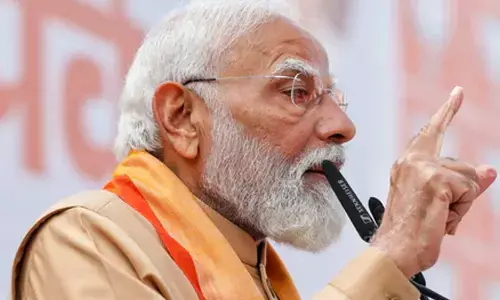'Goodbyes, they often come in waves'

My brother was leaving Nepa Nagar after a long stint as a chemical engineer in the paper mill located there. Nearly the whole town (quite a small one really), had turned up.
My brother was leaving Nepa Nagar after a long stint as a chemical engineer in the paper mill located there. Nearly the whole town (quite a small one really), had turned up. A good friend of my brother's said to him, "Murthy see how many people are here to see you off!" Before my brother could express his appreciation for (what he thought was) a demonstration of his popularity, the friend continued, "and also to make sure that you are really going away!" The exchange was typical of the friendly banter which brother and his friends were used to. Brother, himself, was not above such wit and sarcasm. I had chronicled, in an earlier piece, how, after one of my visits to his house, he came to see me off one with the parting shot, "come again when you don't have so much time to spare!"
Partings always carry with them a certain amount of sadness and pain. Which is probably the reason why parting greetings in many languages carry in them ring of reassurance that a future meeting is hoped for. 'Au revoir' in French, and the German 'auf wiedersehen', convey precisely that sense. As does 'ciao' in Italian. The English 'see you' has got abbreviated into s'ya. In India, particularly in the Southern states, it is common to say "I shall go and come". 'Vellostanu' in Telugu or 'poyittu varen' in Tamil. Once again in the same spirit as the French and German counterparts.
My uncle related to me the incident about my father going to the Central Station in Chennai (then Madras), to see off my mother who was going home for confinement. Knowing how deeply my father would miss my mother, my uncle jocularly told my mother to stay back in her father's house forever and not come back. Unable even to bear the very thought, father apparently burst into tears, right there, in public view, on platform number 6 of the Madras Central Station!
The French carry the description of the pangs of separation to the extreme in a saying "partir est un pue de mourtir," or "to part is to die a little." Not all partings, of course, need be tinged with sorrow, as, for instance, those with one's own pet dogs. The farewell is quite subdued and not too much fuss is made, probably because the pet does not understand that the master, or mistress, is leaving for a while, unlike the daily routine departure. But when he or she returns? One must, indeed, witness the scene of uncontrollable joy, and violent affection, on display! In my own case I had often to call home from the airport or the railway station to make sure that my two pet dogs were tied up, before my reaching home, purely in order to ensure my physical safety! And after I had settled down, and was prepared to take them on, it was really a hectic 15 or 20 minutes, during which I barely survived serious permanent damage on account of their assault. In fact, on one occasion, Scamper, my irrepressible Golden Retriever, was accompanying me for a walk around my house. In sheer joy, he ran away from me, rounded the house and, quite without my knowledge, banged into me from behind. The consequent fall, I am afraid, was quite serious and I sustained a head injury requiring hospitalisation overnight. Nothing serious, of course, but bad enough for Scamper to feel guilty for several days after that, until I took the pains to console him and make him understand what had happened was not his fault.
As we all know, not all partings are temporary. There is that final departure after which one never comes back. Friends and well-wishers will never see one again. "Ki aata nahin koyi mulk-e-adam se," as the song goes in the memorable film, Taj Mahal. Which is probably why Hindu funeral rituals prescribe that one should, after their completion, walk away from the graveyard without looking back. The idea is to prevent the onset of what is called "smasana vairagya," or a sense of despondency about the purposeless of life and the inevitability of death.
Farewell functions are also organised usually when a person retires from service, or is going away for a long time, for studies or work, to a faraway place. I had over 25 of them during my service. Most of them were generally stereotyped, with (mostly contrived!), praise being showered on my character, conduct, integrity, professional expertise, firmness in standing my ground with superiors and fair treatment of subordinates, among other things.
One series of function I shall never forget is the one when I was transferred away from Guntur district where I was Collector for barely three months. Following a request by the Governor of the state for me to be posted as her Secretary, my tenure was cut short abruptly. P.G. Wodehouse says, in one of his hilariously witty novels, that a horse ran a race so poorly that, but for a burst of speed towards the end, it would have got mixed up in the next race! In my case the tenure was so short that, sometimes, I was not too sure whether the function was to welcome me or to bid farewell! And then there were so many of them with sometimes two breakfasts, three lunches and a couple of dinners getting packed into one day. Another event that stands out in my memory is the farewell I was accorded in the Andhra Pradesh State Secretariat upon my superannuation. As functions went it was just like any other one I had experienced earlier, except that a lady colleague, speaking on the occasion, and recalling the days when she was a school child, and I was Sub-Collector at Ongole, (headquarters of Prakasam district, her father K. Chandraiah being the Collector then), said, in that formal and solemn occasion, and to a serious audience, that I used to remind her of the cinema actor Rishi Kapoor!
Another remarkable farewell was when my friends got together to see me off on the eve of my departure to Visakhapatnam, where I had just been posted as the Managing Director of the Andhra Pradesh Fisheries Corporation. The gathering got so emotional, and the farewell so extended, that I finally missed the flight!
Farewell occasions are often marked a certain awkwardness, between those going away and those seeing them off. No one really knows what to say, and there are uncomfortable pauses in between. Max Beerbohm, the great essayist of yesteryear, puts it beautifully when he says that the occasions are characterised by "sadness mingled with festivity." Emphasising how important the act of seeing off has become in people's lives, Beerbohm refers to a (clearly imaginary) organisation called the Anglo-American Social Bureau, the members of which are paid handsomely to see off Americans on a visit to England, when they leave from one place to another! A sad reflection on the attitude of the British towards foreigners.
Before I end, I must share the incident of my uncle (also father-in-law) leaving our house after a visit, and saying, "Vellostanu" in keeping with the custom. Father promptly told him that he was welcome to go but need not bother to come back!
(The writer is former Chief Secretary, Government of Andhra Pradesh)
(The opinions expressed in this column are that of the writer. The facts and opinions expressed here do not reflect the views of The Hans India)










